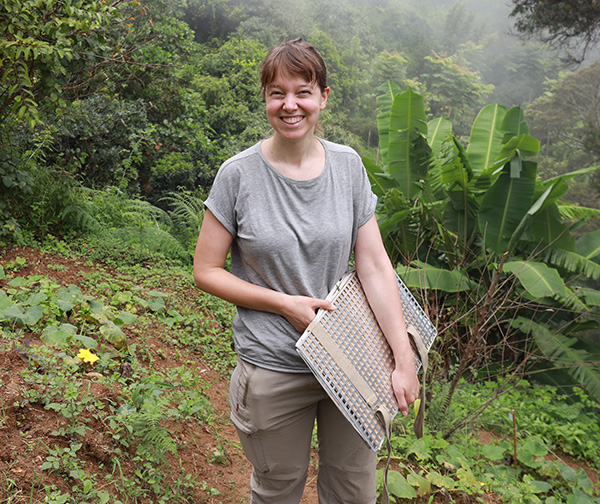Nele Mullens

Nele is a PhD student at the University of Antwerp through the BELSPO BRAIN Project ISeBAF coordinated by the Royal Museum for Central Africa
There is a growing concern about the effect of pesticides used in agriculture on both human health and pollinators who are in decline worldwide. Therefore it is important we find more sustainable agricultural practices, which will not only protect biodiversity and health but also provide enough food for our growing human population. The goal of four PhD students working on the thematic BRAIN project ISeBAF (Insect Service and Biodiversity in Agroecological Farming, B2/191/P1/ISeBAF, 2020-2025) is investigating agroecological farming as an ecologically and economically sustainable approach for small scale agriculture in east Africa. A general paradigm of the agroecological approach is that ecosystem services and biodiversity are directly linked, so that promoting biodiversity (including species and genetic diversity) represents one of the founding principles of this discipline. In this context, agroecological practices aim at increasing diversity of land compositional heterogeneity including natural and semi- natural habitats, and at promoting invertebrate biodiversity in farmland, including diversity of beneficial insects. B biodiversity is inherently a hierarchical concept encompassing different levels of organization, i.e. genes, populations, species, ecological communities and ecosystems. ISeBAF aims at providing a reference test-case with a first quantitative description of relationships between agroecological land management and biodiversity of both insect pollinators and agricultural pests in small-scale cucurbit production in sub-Saharan Africa.
My PhD research within the framework of ISeBAF investigates how agroecological farming in the Morogoro area (Tanzania) affects the genetic biodiversity of pollinating Diptera from the family Syrphidae and of frugivorous flies of the family Tephritidae. More specifically, I’m comparatively analyzing their genetic diversity in agroecological and conventional agriculture using multi-disciplinary “-omic" tools including phylogenomics, gut microbiomics and pollen metagenomics. As a spinoff of the ISeBAF research, and in collaboration with the reference taxonomists of RMCA, my PhD program will also promote integrative genomic / morphological taxonomic revisions of Afrotropical insects.
Through this research, we hope to increase our understanding on how agroecological agriculture affect the diversity of both agricultural pests and beneficial insects. Hopefully, what we learn from this can help guide a transition to more sustainable farming practices.